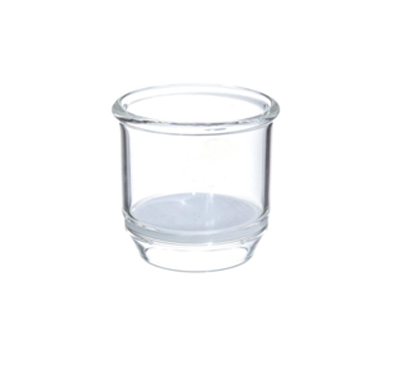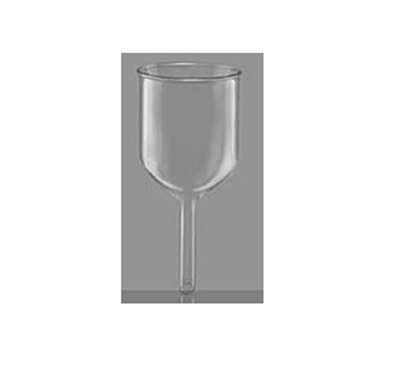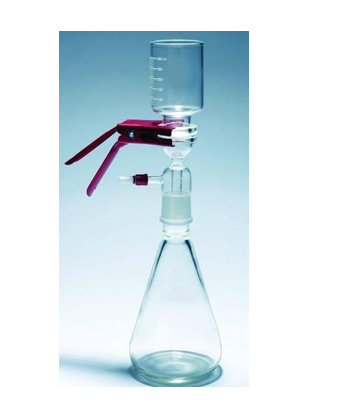Sintered ware
Technical Data
Sintered Glassware is used for filtration of liquids and gases in the laboratory. It has a non-corrosive and reusable porous glass disc as the filter media. It is also used for gas washing, dispersion and absorption. The Sintered Disc is manufactured by crushing Borosilicate glass, and then powdering, cleaning and separating it into various mesh sizes, and finally, fusing it together in the form of a Disc. Sintered Discs are classified into 5 grades - G1, G2, G3, G4 and G5. The grades are defined in terms of the maximum pore size that is obtained by measuring the pressure at which the first air bubble breaks away from the filter, under specified conditions. The pressure differential is then used to calculate the equivalent capillary diameters in microns. The desired pore size is obtained by controlling the grain size, firing time, temperature and thickness of the Disc. Each Disc is tested and graded individually.
Porosity Grades And Their General Use
| Porosity Grade | Pore Size (Microns) | General use |
| 1 | 90-150 | Filtration of coarse materials / precipitates, gas dispersion, gas washing, extractor bed, support for other filter materials. |
| 2 | 40-90 | Filtration of medium precipitates gas dispersion, gas washing |
| 3 | 15-40 | Filtration of fine grain precipitates. Analytical work with medium precipitates. Mercury filtration |
| 4 | 5-15 | Analytical work with fine and very fine precipitates. Non return mercury valves |
| 5 | 1-2 | Bacteriological filtration |
Operating Pressure
Sintered Discs, and the glassware that incorporates them, are designed mainly for the application of vacuum or for passage of gases at relatively low pressure. In all cases, the differential pressure must not exceed 100 KN / m2 (15 psi).
Thermal Limitations
Sintered Ware has a lower level of resistance to thermal shock as compared to standard Borosilicate glassware. Therefore, articles of Sintered Ware should not be subjected to excessive temperature changes or direct flames.
Sintered Crucibles are especially suitable for drying to constant weight. Dry Sintered Crucibles at room temperature, can be placed directly into a drying oven. Sintered Ware may safely be heated in a furnace to 500°C without any adverse effects, while ensuring that the cycle of heating and cooling is gradual. It is recommended that the rate of heating does not exceed 20°C/min. This prevents internal strains caused by excessive temperature differences between the surrounding glass vessel and the Sintered Disc that, in turn, can lead to fracture of the apparatus.
When cold and damp, Sintered Ware of porosity grades 4 and 5 should never be subjected to a sudden temperature change as the evolution of steam may generate pressure within the filter, sufficient to crack it.
Filtration Apparatus should be kept on its rim (stem upwards) in an oven or steriliser. A perforated support base is advantageous for air convection in case of pipeline filters. By using heat insulating material such as asbestos, care should be taken to avoid premature heating near the filter seal. The apparatus should remain in the oven or steriliser during cooling, to prevent excessively fast cooling.
Cleaning Of Sintered Ware
New Sintered Filters should be washed carefully with hot hydrochloric acid, and then rinsed with distilled water before use. Such treatment ensures that all loose particles are removed from the Filter. It is advisable to clean all Sintered Filters thoroughly, immediately after use, as cleaning is easiest at this time, and it also reduces the risk of contamination in the next use.
Many precipitates can be removed from the filter by back-flushing with water. However, great care must be taken with large diameters and fine filters, as positive pressures on the reverse side may break the filter. Under no circumstances should Sintered Apparatus be subjected to mains water pressure when back-flushing, as in most instances this leads to fractured filters. Drawing water through the filter from the reverse side, by means of a vacuum pump, is also effective.
Filters clogged with dust and dirt during gas filtration can be restored by treatment with warm detergent solution, followed by blowing clean air through, from the clean side of the filter. Dirt particles are brought to the surface by the foam, and removed by rinsing with water.
Some precipitates that clog the filter may be removed by chemical cleaning, as indicated below:
▪Fats and grease
Carbon tetrachloride or suitable organic solvent
▪ Albumen glucose:
Hot ammonia or hydrochloric acid, mixture of hot concentrated sulphuric and nitric acids
▪ Organic substances :
'Chromic' acid cleaning solution* or concentrated sulphuric acid containing a little potassium nitrate or perchlorate (0.5%) (may need to be soaked overnight)
▪ Copper or iron oxide :
Hot concentrated hydrochloric acid with potassium chlorate.
▪ Barium sulphate :
Hot concentrated sulphuric acid
▪ Mercury Residues :
Hot concentrate nitric acid
▪ Mercury Sulphide :
Hot aqua regia
▪ Silver chloride :
Ammonia or sodium hyposulphite
▪ Stannic oxide :
Boiling sulphuric acid**
Alumina or silica residues :
2% hydrofluoric acid followed by concentrated sulphuric acid. Rinse immediately with distilled water and then with acetone. Continue rinsing until no trace of acid remains.
High concentrations of hydrofluoric acid, hot phosphoric acid or caustic alkali solutions should never be used for cleaning. Using these
causes a rapid deterioration in the filter and an increase in pore size.
* For bacteriological, pharmaceutical and biological work, 'chromic' acid cleaning solution should be avoided in view of the biological
effect of chromium ions.
** Boiling sulphuric acid may introduce undue thermal strain. It is therefore advisable to leave the item in the acid to cool.
-
9028– Crucible
Gooch Type, Low Form, with Sintered Disc
- Made of 3.3 borosilicate glass
- Particularly adapted to analytical work where precipitates are dried to constant weight at 110°C
- Crucibles should not be subjected to sudden temperature changes
- In order to avoid strain, they should not be removed from the furnace until the temperature has dropped to 250°C
- Gooch Crucible is used for metal casting and analysis
Product code Capacity (ml) Porosity Grade (mm) Dia of Disc (mm) Approx Height Quantity Per case CR902815S1 15 1 20 50 10 CR902815S2 15 2 20 50 10 CR902815S3 15 3 20 50 10 CR902815S4 15 4 20 50 10 CR902815S5 15 5 20 50 10 CR902830S1 30 1 30 60 10 CR902830S2 30 2 30 60 10 CR902830S3 30 3 30 60 10 CR902830S4 30 4 30 60 10 CR902830S5 30 5 30 60 10 CR902850S1 50 1 40 65 10 CR902850S2 50 2 40 65 10 CR902850S3 50 3 40 65 10 CR902850S4 50 4 40 65 10 CR902850S5 50 5 40 65 10

-
9029– Crucible
Filter, for Gooch Crucibles (Herarchi) Funnel
- Made of 3.3 borosilicate
- Suitable for use with Borosil's Filtering Crucibles Gooch type with Sintered Disc
Product code Approx OD x Height (mm)) Quantity Per case CR90290S1 27 x 150 5 CR90290S2 36 x 160 5 CR90290S3 56 x 170 5

-
9030–All Glass Filter Holder
Filtration assembly
- Manufactured from 3.3 Borosilicate glass with fritted glass filter base
- The base design has an integral vacuum connection located above the filtrate drip to prevent contamination of the vacuum line from droplets
- Anodised aluminium spring clamp. The filter size is 47 mm
- The effective filtration area is 9.6 cm2
- Used for filtration of HPLC solvents and aqueous mobile phase solutions and
- The scaled funnels simplify dosing and analysis
Product code Capacity (ml) Filtration base size (mm) Quantity Per case FA9030500 500 47 1 FA903001L 1000 47 1 FA903002L 2000 47 1 FA903005L 5000 90 1
Product code for Spares Capacity/ Size Spares Description Quantity Per case SPFLK500 500 ml Flask (B40 Cone) For Filter Holder 1 SPFLK01L 1000 ml Flask (B40 Cone) For Filter Holder 1 SPFLK02L 2000 ml Flask (B40 Cone) For Filter Holder 1 SPFUN0S1 300 ml Funnel For Filter Holder 47 mm 1 SPFSB0S1 47 mm, B40 Filter Support Base 1 SPAC0S1 47 mm Aluminium Clamp for Filter holder 1
Product code for Spares Capacity/ Size Spares Description Quantity Per case SPFLK02L 5000 ml Flask (B55 Cone) For Filter Holder 1 SPFUN0S1 1000 ml Funnel For Filter Holder 47 mm 1 SPFSB0S1 90 mm, B55 Filter Support Base 1 SPAC0S1 90 mm Aluminium Clamp for Filter holder 1




